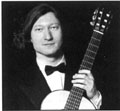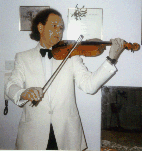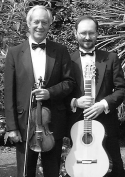Hello and welcome to the first Countdown! Newsletter
The idea is simply to give you some background information about the big concert on 21st June including how and why the idea came about, what the music in the programme is like, and various fascinating things like, how do you actually fix a first-rate orchestral concert in the county town of Dorset in the first place?
So first of all, what exactly is happening that I'm getting so excited about it that I insist on telling everybody about it all?
Good question. Well, on 21st June this year, the Summer Solstice, Midsummer Night, there is going to be an exceptionally fine concert here in Dorchester. Because of the date, the programme will start with one of the most popular overtures ever written: Mendelssohn's Overture to A Midsummer Night's Dream. And it will all end with another extremely popular piece, Schubert's Fifth Symphony. In between those two items will come my own first Guitar Concerto, and this is where the whole thing started.
I wrote this concerto in 1992 when I was still at college, but for one reason or another it was never actually performed by anybody. Later on I wrote two more concertos which did get played various times, but not the first one. So by 2001 when the idea for this event arose, it was approaching a decade since I had written it and I thought it was about time to actually do something about the situation, helped by the fact that by then I knew enough people in the local orchestral music world to know that I would be able to assemble the required players.
But the most important thing about a concerto is that it is a work for a virtuoso soloist, accompanied by the orchestra. So in a sense that's the hardest thing to find the virtuoso soloist that is!
Fortunately, when I had originally finished all the editing and messing about with the piece all that time ago, one extremely fine guitarist had expressed a serious interest in doing it. I had, of course sent the score and a tape produced by the computer, to lots of different players and conductors: but the brave soul who had actually picked up the phone and said "I would like to do it" was Fabio Zanon. That's Fabio here on the right.
However, not least because he wasn't quite as famous back then as he is now, he wasn't in a position to snap his fingers and have a conductor and orchestra do exactly what he wanted, so it never happened then. Basically, there is one guitar concerto that everybody does, and everybody knows, and under normal circumstances, no promoter will risk putting on anything else: it's the famous Rodrigo Concierto d' Aranjuez.
No other instrument is so utterly dominated by just one work to the exclusion, effectively, of all the others. You can imagine this is not a very healthy situation especially if you have just written a guitar concerto and want somebody to play the thing.
So that is what is happening: my (understandably) unfamiliar composition, somewhat balanced I hope by very familiar for good reasons works by other composers. Making this happen is going to take quite a lot of doing it will in fact be by far and away the biggest thing I have ever done, quite probably the biggest thing I ever do.
The next thing to decide is what the orchestra will be called and believe it or not, there are quite a few issues hanging on that. That however is for the next exciting instalment of Countdown!
But what's this fairy doing here?



